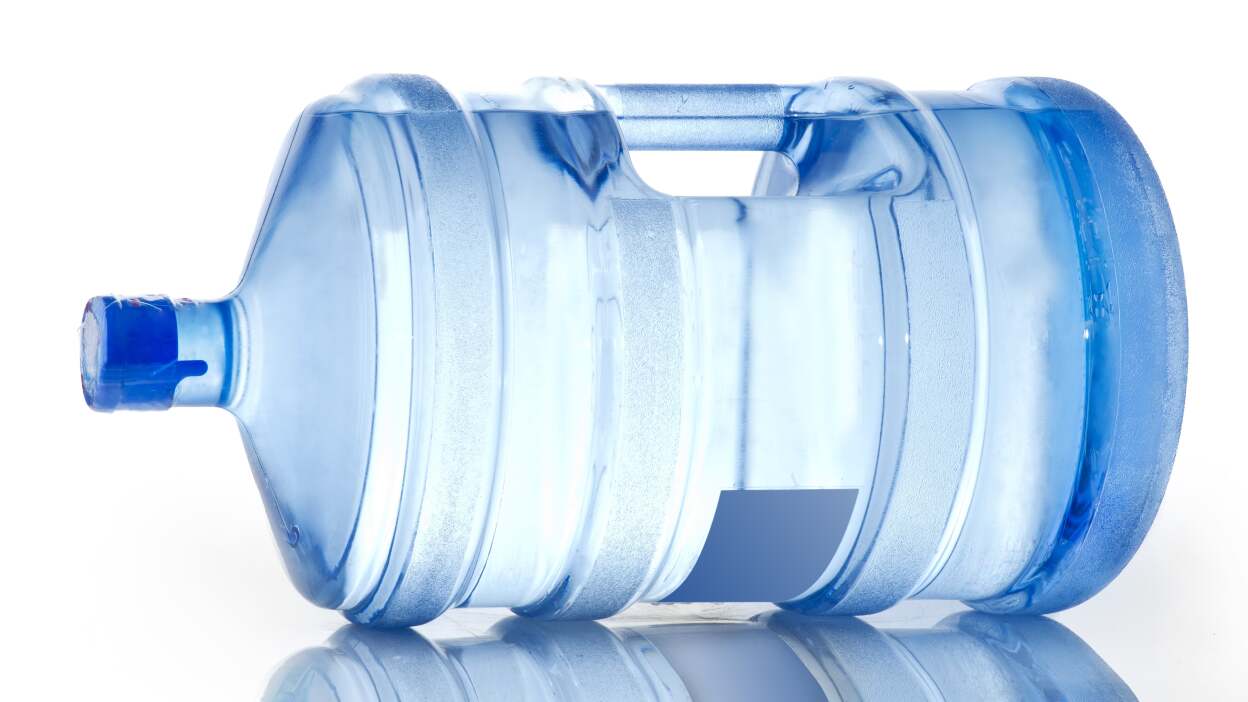“How much does a 5 gallon jug of water weigh” approximately 41.6 pounds (18.9 kilograms) when filled with room-temperature water at around 70°F (21°C). The empty container itself adds 1 to 2 pounds, so the total weight you actually lift is typically 42 to 43 pounds. Understanding the precise weight of a 5-gallon water jug matters for lifting safety, shipping calculations, hydration systems, and industrial handling. Let’s examine how this number is calculated, what affects it, and why even small variations in density or temperature matter.
Understanding How Water Weight Is Calculated
The basic formula
To calculate water weight accurately, you multiply volume × density.
-
1 U.S. gallon = 3.785 liters
-
Water density ≈ 1 kilogram per liter at 4°C
-
3.785 × 5 gallons = 18.925 liters
→ 18.925 kilograms × 2.20462 = 41.7 pounds
Hence, 5 U.S. gallons of pure water = 41.7 pounds at standard conditions.
Temperature and Density Variation
Water’s density slightly decreases as temperature increases. This change, although small, alters total weight per gallon.
| Temperature (°F / °C) | Weight per US Gallon | 5-Gallon Total |
|---|---|---|
| 39.2°F / 4°C | 8.345 lb | 41.73 lb |
| 62°F / 16.7°C | 8.3454 lb | 41.73 lb |
| 70°F / 21°C | 8.33 lb | 41.65 lb |
| 100°F / 37.7°C | 8.02 lb | 40.10 lb |
At cooler temperatures, water molecules are closer together, increasing mass per gallon. That is why cold water weighs slightly more than warm water.
For instance, refrigerated bottled water (≈39°F) can weigh 0.1–0.2 pounds more per jug than room-temperature water.
Weight of the Container (Jug or Bottle)
The weight of the jug itself depends on the material:
| Jug Material | Average Empty Weight | Total (Water + Jug) |
|---|---|---|
| PET Plastic (Standard) | 1–1.5 lb | 42.6–43.2 lb |
| Polycarbonate Reusable | 1.8–2 lb | 43.5–43.7 lb |
| Glass (Dispenser Type) | 4–5 lb | 46–47 lb |
Most bottled water delivery systems use polycarbonate jugs that are reusable and BPA-free, balancing durability with manageable weight.
Therefore, the average full 5-gallon jug weighs 42–43 pounds total, considering water plus container.
US vs. Imperial Gallon Weight Difference
It is important to specify which gallon measurement you’re using:
| Type of Gallon | Liters per Gallon | Weight of 5 Gallons (Water Only) |
|---|---|---|
| U.S. Gallon | 3.785 L | 41.6 lb (18.9 kg) |
| Imperial Gallon (U.K.) | 4.546 L | 50.1 lb (22.7 kg) |
This distinction means a 5-gallon U.K. jug holds 20% more volume and therefore weighs more than its U.S. counterpart.
For international readers, confirm whether your system uses U.S. or Imperial units before applying calculations.
Why Knowing Water Weight Matters
-
Ergonomics & Safety:
Lifting 42 pounds repeatedly can strain muscles. Office delivery staff and home users must follow ergonomic techniques to prevent injuries. -
Transportation Costs:
Water shipments calculate freight by weight; understanding 5-gallon totals helps optimize truck capacity and reduce cost per load. -
Equipment Compatibility:
Water coolers, racks, and dispensers are designed to support specific weights. Exceeding limits risks structural strain or leakage. -
Industrial & Laboratory Use:
Accurate mass ensures proper chemical dilution, coolant management, or hydrostatic testing accuracy.
Factors That Slightly Alter the Weight
| Factor | Description | Impact on Weight |
|---|---|---|
| Temperature | Colder water = denser | +0.1–0.3 lb |
| Mineral Content (TDS) | Hard or mineral-rich water slightly denser | +0.05–0.1 lb |
| Jug Residue | Air pockets or leftover solids | Negligible |
| Pressure Altitude | Minimal change at normal elevations | None |
| Fill Line Accuracy | Underfilled by 1% reduces ~0.4 lb | -0.4 lb |
Even though these changes are small, industries like food processing, beverage bottling, and shipping logistics account for them precisely.
Safe Handling Tips for a 5-Gallon Jug
-
Position the jug near waist height before lifting.
-
Use both hands one on the neck handle, one under the base.
-
Lift with legs, not your back.
-
Avoid twisting while carrying.
-
Use mechanical lifts or carts for multiple bottles.
According to workplace safety data, lifting above 50 pounds repeatedly increases back injury risk. Since a full jug is ~42–43 pounds, it’s near the ergonomic threshold for one-person lifting.
Real-World Examples
| Brand / Product | Jug Material | Stated Total Weight | Notes |
|---|---|---|---|
| Culligan® 5-Gallon Delivery Jug | Polycarbonate | ~42 lb | Common in office coolers |
| Primo® Refill Jug | BPA-free PET | 42–43 lb | Lightweight option |
| Nestlé Pure Life® Jug | Plastic | 42 lb | Standard refill size |
| Sparkletts® 5-Gallon | Recycled Plastic | 43 lb | Reinforced cap & handle |
Despite minor brand variations, all 5-gallon jugs on the U.S. market weigh within ±1 pound of 42 lb when full.
| Category | Value | Unit |
|---|---|---|
| Water weight (5 gal @70°F) | 41.65 | lb |
| Empty plastic jug | 1.5 | lb |
| Total average weight | 43.1 | lb |
| Water weight (5 gal @39°F) | 41.73 | lb |
| Water weight (5 gal @100°F) | 40.10 | lb |
| 5 Imperial gallons (UK) | 50.1 | lb |
| 5 gallons in kg | 18.9 | kg |
| 5 gallons in liters | 18.925 | L |
See More: Coolant and Distilled Water: The Complete Automotive Guide
Short Facts Summary
-
1 U.S. gallon of water = 8.33 lb (3.78 kg)
-
5 gallons = 41.6 lb (18.9 kg)
-
Full jug = ≈43 lb (19.5 kg) including container
-
U.K. (Imperial) 5 gallons = 50.1 lb (22.7 kg)
-
Cold water heavier than hot
-
Jug material changes total weight slightly
Quick Formula Reference
Weight (lb)=Gallons×8.33\text{Weight (lb)} = \text{Gallons} × 8.33 Weight (kg)=Gallons×3.785\text{Weight (kg)} = \text{Gallons} × 3.785 Total Lift Weight=Water Weight+Jug Weight\text{Total Lift Weight} = \text{Water Weight} + \text{Jug Weight}
Use these equations to compute custom values for different sizes—e.g.,
-
3-gallon jug ≈ 25 lb
-
4-gallon jug ≈ 33 lb
Frequently Asked Questions (FAQs)
Q1: How much does a 5-gallon jug of distilled water weigh?
A: Distilled water has a density of 0.998 g/mL at 20°C, nearly identical to pure water, so it weighs about 41.6 lb for 5 gallons.
Q2: Is a 5-gallon jug too heavy for one person?
A: It weighs roughly 42–43 lb; most healthy adults can lift it with correct technique. If in doubt, use a stand or ask for help.
Q3: How much does 5 gallons of salt water weigh?
A: Saltwater density is ~1.025 g/mL, so 5 gallons weigh ~42.7 lb, slightly more than pure water.
Q4: How do you reduce the strain when replacing bottles?
A: Use a bottom-load dispenser, lift with legs, and position the jug near waist height.
Q5: How heavy is 5 gallons of milk compared to water?
A: Milk has a density around 1.03 g/mL, so 5 gallons weigh ≈43 lb, marginally heavier than water.
See More: Jobs on Petrol Platform: Complete Guide to Careers Offshore
Conclusion
A 5-gallon jug of water weighs about 41.6 pounds (18.9 kilograms) for the water alone and 42–43 pounds total when you include the jug. Temperature, mineral content, and jug material cause minor differences, but this figure remains consistent across household, office, and industrial uses.

